- CLASSIC MAGAZINES
- REVIEW CREW
A show recapping what critics thought back
when classic games first came out! - NEXT GENERATION'S BEST & WORST
From the worst 1-star reviews to the best
5-stars can offer, this is Next Generation! - NINTENDO POWER (ARCHIVE)
Experience a variety of shows looking at the
often baffling history of Nintendo Power! - MAGAZINE RETROSPECTIVE
We're looking at the absolutely true history of
some of the most iconic game magazines ever! - SUPER PLAY'S TOP 600
The longest and most ambitious Super NES
countdown on the internet! - THEY SAID WHAT?
Debunking predictions and gossip found
in classic video game magazines! - NEXT GENERATION UNCOVERED
Cyril is back in this spin-off series, featuring the
cover critic review the art of Next Generation! - HARDCORE GAMER MAGAZING (PDF ISSUES)
Download all 36 issues of Hardcore Gamer
Magazine and relive the fun in PDF form!
- REVIEW CREW
- ELECTRONIC GAMING MONTHLY
- ELECTRONIC GAMING MONTHLY RANKS
From Mario to Sonic to Street Fighter, EGM
ranks classic game franchises and consoles! - ELECTRONIC GAMING MONTHLY BEST & WORST
Counting down EGM’s best and worst reviews
going year by year, from 1989 – 2009! - ELECTRONIC GAMING BEST & WORST AWARDS
11-part video series chronicling the ups and
downs of EGM’s Best & Worst Awards!
- ELECTRONIC GAMING MONTHLY RANKS
- GAME HISTORY
- GAME OVER: STORY BREAKDOWNS
Long-running series breaking down game
stories and analyzing their endings! - A BRIEF HISTORY OF GAMING w/ [NAME HERE]
Real history presented in a fun and pithy
format from a variety of game historians! - THE BLACK SHEEP
A series looking back at the black sheep
entries in popular game franchises! - INSTANT EXPERT
Everything you could possibly want to know
about a wide variety of gaming topics! - FREEZE FRAME
When something familiar happens in the games
industry, we're there to take a picture! - I'VE GOT YOUR NUMBER
Learn real video game history through a series
of number-themed episodes, starting at zero! - GREAT MOMENTS IN BAD ACTING
A joyous celebration of some of gaming's
absolute worst voice acting!
- GAME OVER: STORY BREAKDOWNS
- POPULAR SHOWS
- DG NEWS w/ LORNE RISELEY
Newsman Lorne Riseley hosts a regular
series looking at the hottest gaming news! - REVIEW REWIND
Cyril replays a game he reviewed 10+ years
ago to see if he got it right or wrong! - ON-RUNNING FEUDS
Defunct Games' longest-running show, with
editorials, observations and other fun oddities! - DEFUNCT GAMES QUIZ (ARCHIVE)
From online quizzes to game shows, we're
putting your video game knowledge to the test!- QUIZ: ONLINE PASS
Take a weekly quiz to see how well you know
the news and current gaming events! - QUIZ: KNOW THE GAME
One-on-one quiz show where contestants
find out if they actually know classic games! - QUIZ: THE LEADERBOARD
Can you guess the game based on the classic
review? Find out with The Leaderboard!
- QUIZ: ONLINE PASS
- DEFUNCT GAMES VS.
Cyril and the Defunct Games staff isn't afraid
to choose their favorite games and more! - CYRIL READS WORLDS OF POWER
Defunct Games recreates classic game
novelizations through the audio book format!
- DG NEWS w/ LORNE RISELEY
- COMEDY
- GAME EXPECTANCY
How long will your favorite hero live? We crunch
the numbers in this series about dying! - VIDEO GAME ADVICE
Famous game characters answer real personal
advice questions with a humorous slant! - FAKE GAMES: GUERILLA SCRAPBOOK
A long-running series about fake games and
the people who love them (covers included)! - WORST GAME EVER
A contest that attempts to create the worst
video game ever made, complete with covers! - LEVEL 1 STORIES
Literature based on the first stages of some
of your favorite classic video games! - THE COVER CRITIC
One of Defunct Games' earliest shows, Cover
Critic digs up some of the worst box art ever! - COMMERCIAL BREAK
Take a trip through some of the best and
worst video game advertisements of all time! - COMIC BOOK MODS
You've never seen comics like this before.
A curious mix of rewritten video game comics!
- GAME EXPECTANCY
- SERIES ARCHIVE
- NINTENDO SWITCH ONLINE ARCHIVE
A regularly-updated list of every Nintendo
Switch Online release, plus links to review! - PLAYSTATION PLUS CLASSIC ARCHIVE
A comprehensive list of every PlayStation
Plus classic release, including links! - RETRO-BIT PUBLISHING ARCHIVE
A regularly-updated list of every Retro-Bit
game released! - REVIEW MARATHONS w/ ADAM WALLACE
Join critic Adam Wallace as he takes us on a
classic review marathon with different themes!- DEFUNCT GAMES GOLF CLUB
Adam Wallace takes to the links to slice his way
through 72 classic golf game reviews! - 007 IN PIXELS
Adam Wallace takes on the world's greatest spy
as he reviews 15 weeks of James Bond games! - A SALUTE TO VAMPIRES
Adam Wallace is sinking his teeth into a series
covering Castlevania, BloodRayne and more! - CAPCOM'S CURSE
Adam Wallace is celebrating 13 days of Halloween
with a line-up of Capcom's scariest games! - THE FALL OF SUPERMAN
Adam Wallace is a man of steel for playing
some of the absolute worst Superman games! - THE 31 GAMES OF HALLOWEEN
Adam Wallace spends every day of October afraid
as he reviews some of the scariest games ever! - 12 WEEKS OF STAR TREK
Adam Wallace boldly goes where no critic has
gone before in this Star Trek marathon!
- DEFUNCT GAMES GOLF CLUB
- DAYS OF CHRISTMAS (ARCHIVE)
Annual holiday series with themed-episodes
that date all the way back to 2001!- 2015: 30 Ridiculous Retro Rumors
- 2014: 29 Magazines of Christmas
- 2013: 29 Questionable Power-Ups of Christmas
- 2012: 34 Theme Songs of Christmas
- 2011: 32 Game Endings of Christmas
- 2010: 31 Bonus Levels of Christmas
- 2009: 30 Genres of Christmas
- 2008: 29 Controls of Christmas
- 2007: 34 Cliches of Christmas
- 2006: 33 Consoles of Christmas
- 2005: 32 Articles of Christmas
- 2004: 31 Websites of Christmas
- 2003: 29 Issues of Christmas
- 2002: 28 Years of Christmas
- 2001: 33 Days of Christmas
- NINTENDO SWITCH ONLINE ARCHIVE
- REVIEW ARCHIVE
- FULL ARCHIVE
Dragon Ball Z: Budokai HD Collection
Between Raging Blast, Burst Limit, Ultimate Tenkaichi and even an ill-conceived Kinect entry, Dragon Ball Z has been all over the place in the past few years. With so many variations, it's starting to feel like Bandai is flailing around throwing ideas at the wall hoping something sticks. Every new title is trying to recapture the magic of the PlayStation 2-era Budokai games, yet constantly coming up short. With this generation of consoles coming to a close and so many ideas already tried, what is a company to do? If you're Bandai, you quickly toss together Dragon Ball Z: Budokai HD Collection for the Xbox 360 and PlayStation 3.
Originally released in 2002 on the GameCube and PS2, Budokai was something of a revelation. Not due to being a stellar fighting game that could rival Soul Calibur or Virtua Fighter, but rather because it was the first Dragon Ball Z game to not be an epic failure. Up until that point there had only been a few adventures starring Goku, and not a single one of them was worth playing. Budokai changed that, giving fans of the popular anime series some hope.
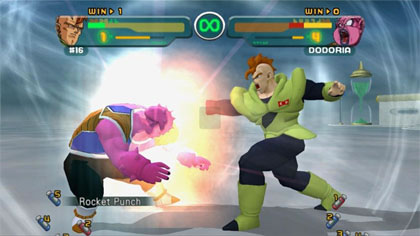
Although presented using crisp polygonal character models and not 2D sprites, the original Budokai is essentially a 2D fighting game. Players are given the usual punch, kick and block buttons, as well as an energy attack that shoots fireballs. Moves are pulled off by completing a series of lengthy button combos, usually leading to an impressive animation that blasts a good chunk of heath off of the opponent's life meter. While it's not a perfect system, I'll give it this: Budokai is one of the few 2D fighting games that does not feel like a blatant rip-off of Capcom's Street Fighter II.
The story is told through a series of cleverly constructed summary videos. They tackle three different sections of the "Dragon" tale, including the Saiyan Story, Namekian Story and the Android story. The cinemas don't mince words; they are quick and to the point. They do a good job of setting up rivalries, establishing motivation and then throwing the characters into one fight after the next.
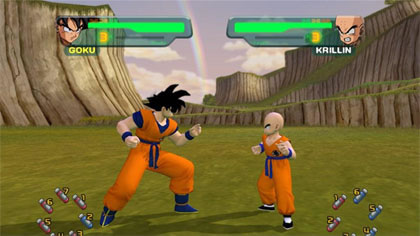
You start out as Goku, fighting bad guys and earning new moves. Along the way you'll switch between other fighters (including Piccolo and Kid Gohan, among others) and fill in different parts of the story. All told, you're looking at several hours of Dragon Ball Z storytelling (significantly less if you decide to skip all of the cut scenes).
Playing through the long-winded story is how you unlock new characters for the two-player versus mode. Here you'll have a choice between 21 Dragon Ball Z favorites, including Vegeta, Frieza, Cell, Raditz, Krillin, #17, Ginyu, as well as the protagonists found in the story mode. Each of these characters is equipped with their own unique special moves, though a lot of them share similar combos and attacks.
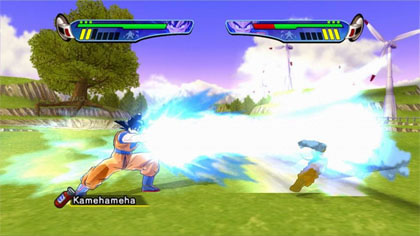
Even though it was technically sound, Budokai feels a bit shallow in retrospect. None of the characters are very deep and the roster is surprisingly small when compared to newer Dragon Ball Z titles. There isn't much to the gameplay, either. Outside of a few combo moves and a few throws, there isn't much to do here. What it did right was mimic the TV show, giving fans hope that eventually Bandai would get it right.
Dragon Ball Z: Budokai 3 is Bandai getting it right! Wisely skipping past the poorly-received sequel, this third installment ditches the animated cinemas in favor of an emphasis on character building. You choose one of a handful of popular characters, each with their own stories and fights to undertake. They fly over a giant map, getting into random fights and traveling through time and space. Along the way they'll earn experience, level up their characters, add new moves and ultimately collect all of the dragon balls.
Budokai 3 is a marked improvement over the original, offering an experience that manages to feel respectful of the source material. The combat mechanics still aren't as deep or interesting as other fighting games on the market, but they are close enough to offer an engaging experience with tons of unique content. Best of all, it sports a giant roster of 42 playable characters, backgrounds taken directly out of the anime and both English and Japanese voice acting.
The fights are also a lot more dynamic, full of characters being thrown completely through mountains. And while it's still essentially a 2D fighting game, it does feel like the player has more freedom in their movement. A number of defensive moves have also been included (teleporting, dodge, etc.), as well as mechanics that make better use out of the kai bar. It all adds up to a surprisingly exciting (not to mention visually arresting) Dragon Ball Z experience. Budokai 3 is fan service done the right way.
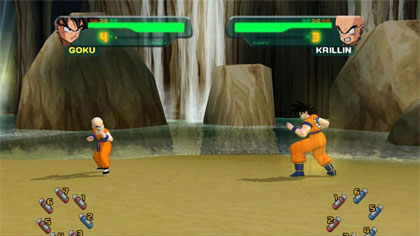
Both games come with the usual secondary modes. You get the usual versus mode, a tournament mode, practice mode, skill edit, etc. Unfortunately, neither Budokai 1 nor 3 offers any kind of online play. This is especially disappointing when you discover how easy the computer is. Omitting online play is especially disappointing when you see Capcom adding it to even their most niche fighting game releases.
Of the two, Budokai 3 is the only one that still looks good. The character models are nice and the cel-shading keeps the game from looking ancient. The 2002 original isn't as lucky. The simple graphics are endearing, but there's no question that it comes from a different console generation. There's a night and day difference between the two products in this compilation.
Even though the original game is simple and something of a novelty in this compilation, it remains a vital addition to Dragon Ball Z: Budokai HD Collection. It's a much more story-driven experience, something that the third game isn't nearly as interested in. The two games are different in ways that complement each other, ultimately making this package stronger.
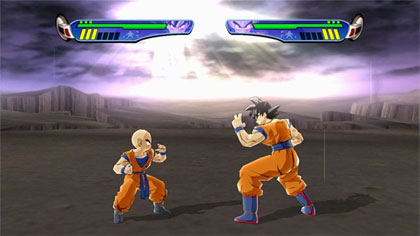
Unfortunately, Bandai made a few questionable changes in bringing these games to current generation consoles. For one thing, much of the music has been replaced with tracks from Tenkaichi and other recent Dragon Ball Z entries. You'll also find a few frames of censorship, which I'm sure will ruffle the feathers of series purists. Interestingly enough, all of the fighting and gameplay is presented in 16 x 9 widescreen, while the menus and some cinemas are kept 4 x 3, with letterboxing on the side. None of these things are deal breakers, but they did leave me wondering what happened behind the scenes in making this HD pack.
Dragon Ball Z: Budokai HD Collection gives fans almost exactly what they're looking for. Unfortunately, this compilation is dogged by a number of weird design decisions and a complete lack of online play. Fans will appreciate the little touches and large roster of characters, but the gameplay and easy computer AI was too simple to hold my attention for long. This is as good as a Dragon Ball Z game gets, and even that isn't enough to make this Budokai HD Collection a must-buy.
HOME |
CONTACT |
NOW HIRING |
WHAT IS DEFUNCT GAMES? |
NINTENDO SWITCH ONLINE |
RETRO-BIT PUBLISHING
Retro-Bit |
Switch Planet |
The Halcyon Show |
Same Name, Different Game |
Dragnix |
Press the Buttons
Game Zone Online | Hardcore Gamer | The Dreamcast Junkyard | Video Game Blogger
Dr Strife | Games For Lunch | Mondo Cool Cast | Boxed Pixels | Sega CD Universe | Gaming Trend
Game Zone Online | Hardcore Gamer | The Dreamcast Junkyard | Video Game Blogger
Dr Strife | Games For Lunch | Mondo Cool Cast | Boxed Pixels | Sega CD Universe | Gaming Trend
Copyright © 2001-2025 Defunct Games
All rights reserved. All trademarks are properties of their respective owners.
All rights reserved. All trademarks are properties of their respective owners.





























